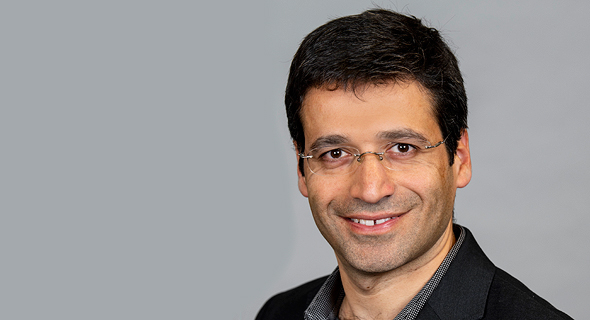Covid-19 Gave Medtech a Push Forward, Says EarlySense CTO
Guy Meger, the chief technology officer of nonintrusive patient monitoring company EarlySense, believes the pandemic helped eliminate innovation-blocking hurdles
13:3412.05.20
If you ask Guy Meger, the chief technology officer and general manager of Israel at EarlySense Ltd., the coronavirus (Covid-19) outbreak has had one positive impact on healthcare systems around the world. The pandemic helped eliminate things that were blocking innovation in the medtech sector, Meger said in a recent interview with 30 Minutes or Less, a podcast dedicated to the Israeli tech scene.
The pandemic highlighted what happens when you let healthcare be left behind in terms of new technologies, Meger said. “Suddenly,” he added, “no one could bear the thought of looking in the mirror a year from now and knowing that there was a technology that could have saved lives that was not adopted due to bureaucratic hurdles.”
 Guy Meger. Photo: Billie Weiss
Guy Meger. Photo: Billie Weiss Founded in 2004 and based in Israeli central town Ramat Gan, EarlySense develops a patient monitoring system capable of registering parameters such as heart and respiratory rates, motion, and quality of sleep. The system uses an ultra-sensitive sensor that is placed under the patient’s mattress and collects data in the background. The company's products are approved for medical use in both the U.S. and the European Union.
The idea first came to EarlySense’s four co-founders when they were dealing with a common problem, Meger said. Each of them had a child suffering from asthma and they wanted to be able to make sure the child is able to breathe regularly while sleeping, without having to disturb them, he explained.
This market, however, was too small, Meger said, and the team soon realized the technology can be used in hospitals for monitoring patients at night. A night nurse can only check on each patient once or twice during their shift, but EarlySense’s system can offer constant monitoring and alert on any changes, he explained.
With the vast amounts of data its system collects, Meger said, EarlySense uses artificial intelligence algorithms to predict when a patient’s condition is likely to deteriorate. According to him, the system can detect early signs of heart or respiratory failure hours before they become life-threatening.
When it comes to Covid-19, EarlySense’s system lets doctors know exactly how their patients are doing and detect signs of deterioration without having to conduct a face-to-face examination and expose themselves to the virus, Meger said. In coronavirus departments that use EarlySense’s technology, there have been no cases of medical staff contracting the virus, he added.
According to Mager, EarlySense’s system is in use in 250 hospitals and medical institutions in the U.S. and seven hospitals in Israel, including the Sheba Medical Center, which was the first to set up a coronavirus department in the country. Sheba contacted EarlySense when it was setting up the department and other hospitals in the country followed suit, Meger said.
EarlySense also has a partnership with Florida-based medical equipment company Hill-Rom Medical LLC and, for the past two years, its latest model has come with the system pre-installed and activated, Meger said.
EarlySense has 120 employees, 65 of whom are based in Israel, and has raised $160 million to date, according to Mager.
The 30 Minutes or Less podcast, which launched in 2017, is hosted by Navot Volk, a senior Israeli tech executive, and tech entrepreneur Aviv Frenkel. The two interview tech founders, investors, and other key members of the Israeli tech ecosystem.



